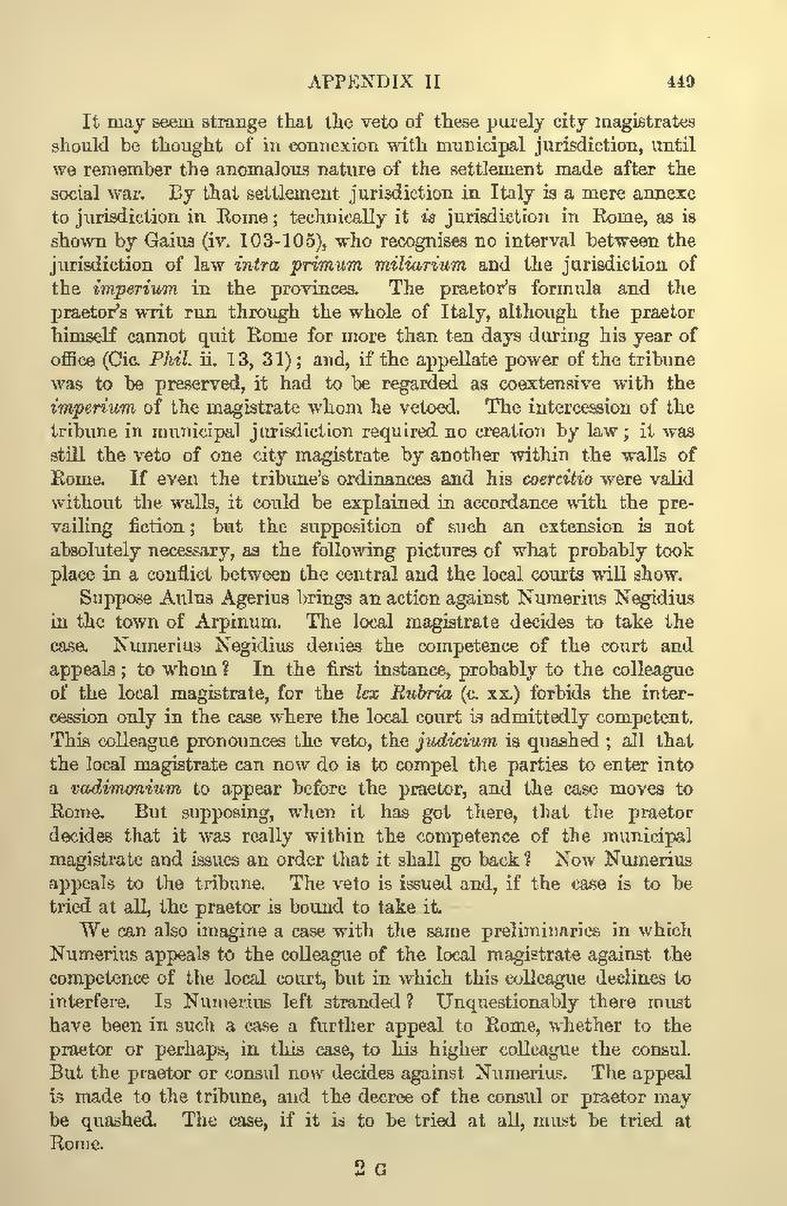It may seem strange that the veto of these purely city magistrates should be thought of in connexion with municipal jurisdiction, until we remember the anomalous nature of the settlement made after the social war. By that settlement jurisdiction in Italy is a mere annexe to jurisdiction in Rome; technically it is jurisdiction in Rome, as is shown by Gaius (iv. 103-105), who recognises no interval between the jurisdiction of law intra primum miliarium and the jurisdiction of the imperium in the provinces. The praetor's formula and the praetor's writ run through the whole of Italy, although the praetor himself cannot quit Rome for more than ten days during his year of office (Cic. Phil. ii. 13, 31); and, if the appellate power of the tribune was to be preserved, it had to be regarded as coextensive with the imperium, of the magistrate whom he vetoed. The intercession of the tribune in municipal jurisdiction required no creation by law; it was still the veto of one city magistrate by another within the walls of Rome. If even the tribune's ordinances and his coercitio were valid without the walls, it could be explained in accordance with the prevailing fiction; but the supposition of such an extension is not absolutely necessary, as the following pictures of what probably took place in a conflict between the central and the local courts will show.
Suppose Aulus Agerius brings an action against Numerius Negidius in the town of Arpinum. The local magistrate decides to take the case. Numerius Negidius denies the competence of the court and appeals; to whom? In the first instance, probably to the colleague of the local magistrate, for the lex Rubria (c. xx.) forbids the intercession only in the case where the local court is admittedly competent. This colleague pronounces the veto, the judicium is quashed; all that the local magistrate can now do is to compel the parties to enter into a vadimonium to appear before the praetor, and the case moves to Rome. But supposing, when it has got there, that the praetor decides that it was really within the competence of the municipal magistrate and issues an order that it shall go back? Now Numerius appeals to the tribune. The veto is issued and, if the case is to be tried at all, the praetor is bound to take it.
We can also imagine a case with the same preliminaries in which Numerius appeals to the colleague of the local magistrate against the competence of the local court, but in which this colleague declines to interfere. Is Numerius left stranded? Unquestionably there must have been in such a case a further appeal to Rome, whether to the praetor or perhaps, in this case, to his higher colleague the consul. But the praetor or consul now decides against Numerius. The appeal is made to the tribune, and the decree of the consul or praetor may be quashed. The case, if it is to be tried at all, must be tried at Rome.
